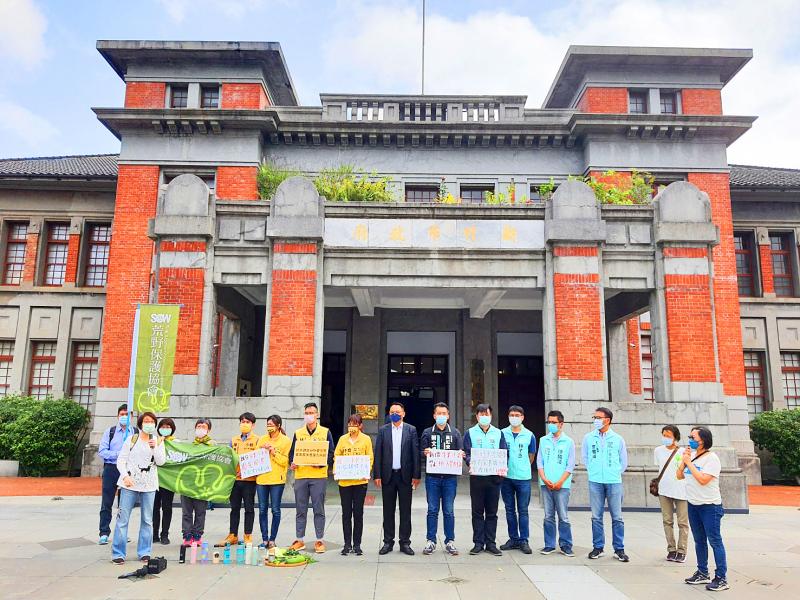The Hsinchu City Council yesterday passed the Hsinchu City Ordinance on Wastewater Discharge Management (新竹市廢水及污水排放管理自治條例), following a referendum last year on the issue.
The referendum on Dec. 18 last year passed with 131,816 yes votes on the question: “Do you agree that the Hsinchu City Government should draft a wastewater management ordinance that would clearly state that industrial, medical and wastewater from other sources should be collected by a dedicated pipeline, the outtake of which should not empty into the intake areas of potable water or upstream of irrigation water intakes?”
The city government yesterday said it had met with local groups, as well as local branches of the Irrigation Agency, to discuss how best to draft the legislation and address the majority view reflected in the referendum.

Photo: Hung Mei-hsiu, Taipei Times
The ordinance seeks to separate drinking water, water used for irrigation and wastewater, the city government said, adding that it is considering civic groups’ suggestions to set up an oversight committee, which would include experts, local groups and city government officials as members.
The city mayor would chair the committee and a meeting would be convened every six months, with extraordinary meetings being held when necessary, an addendum says.
The regulatory details for the establishment of the said committee should be reviewed and ratified by the city council, the addendum says.
Outside Hsinchu City Hall, the Taiwan Clear Water Action Alliance held a rally calling for separate pipes to be set up for industrial waste, medical waste and wastewater produced by other means.
The alliance added that these pipes should not empty into intake areas for potable water or upstream of irrigation water intakes.
The government should start by tackling industries and businesses found to be dumping wastewater, the alliance said, while calling for the establishment of a clause that would allow the city government to file claims to recover illegal gains.

The manufacture of the remaining 28 M1A2T Abrams tanks Taiwan purchased from the US has recently been completed, and they are expected to be delivered within the next one to two months, a source said yesterday. The Ministry of National Defense is arranging cargo ships to transport the tanks to Taiwan as soon as possible, said the source, who is familiar with the matter. The estimated arrival time ranges from late this month to early next month, the source said. The 28 Abrams tanks make up the third and final batch of a total of 108 tanks, valued at about NT$40.5 billion

A group from the Taiwanese Designers in Australia association yesterday represented Taiwan at the Midsumma Pride March in Melbourne. The march, held in the St. Kilda suburb, is the city’s largest LGBTQIA+ parade and the flagship event of the annual Midsumma Festival. It attracted more than 45,000 spectators who supported the 400 groups and 10,000 marchers that participated this year, the association said. Taiwanese Designers said they organized a team to march for Taiwan this year, joining politicians, government agencies, professionals and community organizations in showing support for LGBTQIA+ people and diverse communities. As the first country in Asia to legalize same-sex

MOTIVES QUESTIONED The PLA considers Xi’s policies toward Taiwan to be driven by personal considerations rather than military assessment, the Epoch Times reports Chinese President Xi Jinping’s (習近平) latest purge of the Chinese People’s Liberation Army (PLA) leadership might have been prompted by the military’s opposition to plans of invading Taiwan, the Epoch Times said. The Chinese military opposes waging war against Taiwan by a large consensus, putting it at odds with Xi’s vision, the Falun Gong-affiliated daily said in a report on Thursday, citing anonymous sources with insight into the PLA’s inner workings. The opposition is not the opinion of a few generals, but a widely shared view among the PLA cadre, the Epoch Times cited them as saying. “Chinese forces know full well that

Travel agencies in Taiwan are working to secure alternative flights for travelers bound for New Zealand for the Lunar New Year holiday, as Air New Zealand workers are set to strike next week. The airline said that it has confirmed that the planned industrial action by its international wide-body cabin crew would go ahead on Thursday and Friday next week. While the Auckland-based carrier pledged to take reasonable measures to mitigate the impact of the workers’ strike, an Air New Zealand flight arriving at Taipei from Auckland on Thursday and another flight departing from Taipei for Auckland on Saturday would have to